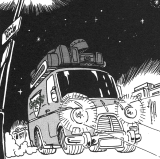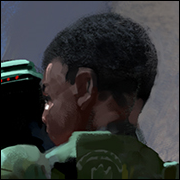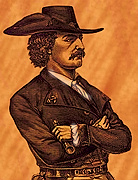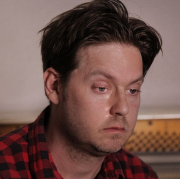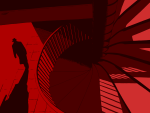|
Milkfred E. Moore posted:But, I guess description is really hard. Just tell! Not using said is one of the classic signs of bad and amateurish writing.
|
|
|
|

|
| # ? May 1, 2024 18:30 |
|
"Excoriate" isn't a terrible word choice -- definitely a ten-dollar word, but not bad if used sparingly in a decent context -- but putting it next to "Cora" is so, so clunky. The feeling I'm getting from this prose is kind of first-draft-ish, like it was written just to get the broad events and blocking down, to be replaced later. The fact that prose like that is still in a book that allegedly took ten years to write is... interesting.
|
|
|
|
Milkfred E. Moore posted:In the chapter I pulled this excerpt from, there are sixteen bits of dialogue. There are four whispereds, two yelleds, one shrieked, one answered, one repeated, one managed, one demanded, one asked, two non-attributed, one 'she heard' and one said. What's so bad about that?
|
|
|
Lex Neville posted:What's so bad about that? It's two things that are bad, but I'm not sure that people picked up on the second part. So, there are sixteen lines of dialogue and fourteen of them are directly tagged. There are multiple exchanges where the dialogue goes: "Blah," said A "Blah," said B "Blah," said A "Blah," said B Honestly, skimming through some chapters, I think Ellis tags every single line of dialogue unless the voice is literally coming from somewhere unknown. It's bad writing. The reader can generally follow along if you go "Blah," said A "Blah," said B "Blah." "Blah." Overusing dialogue tags that aren't said is another sign of that. As a word, said is innocuous. No one notices it, unless you're using it every single line. So, you should, in almost every case, default to just using said when tagging dialogue. If not using said, maybe an action or a gesture that demonstrates some characterization. You don't want, said, said, said - but you really don't want yelled, shrieked, demanded, spoke, snarled, either. I think when writers go hard on words that aren't said, they're confusing good writing advice with exercises they did in an English classroom during Middle School. Words like demanded, bellowed, shrieked really only do two things: slow the pacing down and draw attention to themselves. Like a lot of writing issues new writers have, I think it stems from a lack of confidence in their writing and in the reader to follow it. If someone is demanding something, you should be able to make that clear without needing to write 'X demanded.' Additionally, using said forces the dialogue itself to do the heavy lifting. Unfortunately for Ellis, her dialogue is really bad (honestly, probably the part of the novel I'd say is the overall worst) and no one talks like a real person. So, you dress it up in words that make it sound exciting to trick the reader. But this makes the writing overwrought. I've heard that you should only use dialogue tags that aren't said when the dialogue and context of the dialogue don't match up. "That's awesome," Milky complained, for example. Sometimes you need to use not-said words to quickly clue the reader in to what's happening, too, but that's not what is happening in this case. This is something that an editor absolutely should've caught. 'You have sixteen lines of dialogue in this chapter and fourteen of them are directly tagged despite almost every exchange being between two people, and only one is using said.' It's really, really sloppy writing. I figure this manuscript had a quick pass for grammar and spelling and content, but nothing in the way of actual substantive feedback because these are the stupidly basic 'rules of good writing' that you find in any writing help book you pick up off any given shelf.
|
|
|
|
|
That's a shame even if I'm not surprised. Her media criticism is pretty engaging 101 level stuff, so I was hoping for a light and fluffy scifi. That clunky mess of words just sounds like a slog without even a novel idea to carry it. I would hope she takes in feedback and gets a new editor but lol it got carried to Best Sellers because of internet clout so probably not.
|
|
|
|
I agree on the first bit, but I disagree with resorting to "said". It's used way too liberally already, in particular by writers from the US in my experience. So yes, leave it out altogether more often, but also you idiot writers a question is asked not said
|
|
|
|
Lex Neville posted:What's so bad about that? One of the worst pieces of writing advice that people both give and receive is that "said" is a word that should be avoided at all costs. Nobody should ever have merely "said" something, because that's boring, and lacks punch. Characters should exclaim things, shout them, scream them. In reality, "said" in dialog is in a class of words that are "invisible" to the reader, like pronouns, the word "and," etc. and only become noticeable in excess. You'll only start to really see it in the text if every single character "said" something every single time they spoke, a problem that is easily fixed by embellishing the "said" with other descriptors rather than replacing it wholesale with any word but "said," or by rearranging the flow of the sentence to utilize "said" to provide emphasis. For example:  Here's a page from Nabokov that displays a number of different ways to use "said" in ways that support the text. Someone "said" something six times, but also pronounced and queried - but all of the examples function very differently. It's brief where the text is brief, communicating terseness ("No room," I said.) But compare it to the even more brief "Ah" in the last line, and how much weight the "said" carries, dreaming, smiling, drawing out the Ah... A less confident or skilled writer might have substituted a single, more dramatic word, but ultimately less colorful than what the "said" can carry on its back without being intrusive. "That's not the point," said the logical doomed dear: this does similar. "Said" here does the pedestrian work of anchoring the furtive description of the character while the prose itself fills in the flavor rather than trying to avoid overusing the word "said." However you describe a character's dialog should be responsive to that dialog. The middle paragraph where she "pronounces" rather than says, because she is making a pronouncement rather than merely saying it. But it also creates a long pause in the dialog - you can hear her shyness in the hesitation, because the prose has not only observed that, it has created that space. Poorer writers generally lack the confidence to weave dialog and prose together like that. They tend to compartmentalize them into separate categories of writing, when they're really not. So they try to avoid writing "said," so they'll put in any word but that in order to keep the appearance of action.
|
|
|
|
Heath posted:One of the worst pieces of writing advice that people both give and receive is that "said" is a word that should be avoided at all costs. Nobody should ever have merely "said" something, because that's boring, and lacks punch. Characters should exclaim things, shout them, scream them. In reality, "said" in dialog is in a class of words that are "invisible" to the reader, like pronouns, the word "and," etc. and only become noticeable in excess. You'll only start to really see it in the text if every single character "said" something every single time they spoke, a problem that is easily fixed by embellishing the "said" with other descriptors rather than replacing it wholesale with any word but "said," or by rearranging the flow of the sentence to utilize "said" to provide emphasis. Yeah, I think the key here is that "avoid using 'said'" is often the first piece of advice new writers get about how to keep dialogue-heavy passages from being repetitive, and it's often the only one, when it should be a very minor part of that toolkit compared with developing dialogue rhythm and interspersing dialogue with other actions. It's a part of the general problem of new writers being taught to avoid workmanlike prose and develop more complex, "artistic" writing, without necessarily being taught about using those elements in moderation and in balance with more straightforward language. Developing a proper balance is difficult for everyone, but not even trying gives you the legion of writers who use the most elaborate metaphors possible to describe everything, take "show don't tell" to mean "never describe a straightforward series of plot events or character thoughts," and throw the flashiest verbs at action and dialogue they can.
|
|
|
|
Heath posted:You'll only start to really see it in the text if every single character "said" something every single time they spoke, a problem that is easily fixed by embellishing the "said" with other descriptors rather than replacing it wholesale with any word but "said," or by rearranging the flow of the sentence to utilize "said" to provide emphasis. No no no don't fix it by embellishing. Just ditch the said. Obviously "yelled, shrieked, demanded, spoke, snarled" suck too and more so - that goes without saying - but in general, English-speaking writers could do with leaving out a bunch more saids.
|
|
|
|
Srice posted:The best part of her Hobbit video is when she gets into the behind the scenes stuff, it really shines a light on just how much of a nightmarish mess those movies were. I guess I will reserve final judgment till I watch all the hobbit videos, but this and other responses don't make it sound very promising to me. Like, the kind of criticism I crave focuses on the text itself, criticizing these goofy movies as stories, y'know? It's not that the real world construction of something can't be interesting, it's just not super relevant to whether the piece of art is good or bad. Tons of great films had troubled productions, many terrible ones were dream jobs - but what about the moving pictures themselves? What are they saying? Speculating about the levels of care/interest behind the author for the subject doesn't tell me anything about the work itself, which is usually what I'm more interested in. I already know Jackson and the film industry in general are hostile to labour, that's why I try to limit my financial support of them, even though there is no ethical consumption under capitalism. To be clear, I agree with Ellis' opening argument; that the hobbits are uneven, with both good and bad parts. I suppose my impatience stems from the length of her preamble. Like c'mon, get to the "good/bad, how so?" part already!
|
|
|
|
Ellis is much more of a production and cultural zeitgeist media critic then she is purely textual. her discussions of how movies get made and the philosophy that goes into them is more her niche. her analysis of how celebrity voiceovers started with Aladdin, and the implications on the production of movies, is super fascinating.
|
|
|
|
It confuses me when popular figures who move in educated and literary circles produce work that reads like that. You’d think they’d have a ton of beta readers who would pick any clunky prose apart before it even got to an editors desk.
|
|
|
|
Ccs posted:It confuses me when popular figures who move in educated and literary circles produce work that reads like that. You’d think they’d have a ton of beta readers who would pick any clunky prose apart before it even got to an editors desk. the answer is that most of her fans are probably someone who reads nothing but YA or genre fiction, both of which is full of bad prose
|
|
|
|
Ccs posted:It confuses me when popular figures who move in educated and literary circles produce work that reads like that. You’d think they’d have a ton of beta readers who would pick any clunky prose apart before it even got to an editors desk. If your beta readers are your fans, and they think that ejaculations all over the page are the epitome of good writing, then obviously they won't catch it. There's some really bad writing advice floating around out there, as many people who fail at writing start writing books about how to write.
|
|
|
|
Ccs posted:It confuses me when popular figures who move in educated and literary circles produce work that reads like that. You’d think they’d have a ton of beta readers who would pick any clunky prose apart before it even got to an editors desk. In my experience, amateur/first time writers fall into a couple of categories: 1) preternaturally terrible writers who will shove their poo poo in the face of anyone who may have even the slightest perceived interest - these people are impervious to edits, or if they do respond to them they will ignore any specific editing advice in favor of just elaborating the dumb bullshit they wrote in the first place 2) decent writers who are intimidated by criticism and only show their writing to people who won't be too harsh on it, get told their writing is evocative and wonderful and then never get any real criticism. 3) good writers who write by the seat of their pants and can churn out a first draft that's pretty good without edits - which then means they just don't bother editing and their writing suffers for it. The egoist artiste with potential who ignores the social aspect of writing and reading. Writes a lot of good stuff but never really finishes anything I'm gonna guess Ellis, like most writers, falls in the middle category
|
|
|
|
Heath posted:In my experience, amateur/first time writers fall into a couple of categories: There's a hilarious amount of writers who think criticism is a process where two writers politely inform the other that they are both good writers and that their writing is good.
|
|
|
|
Heath posted:In my experience, amateur/first time writers fall into a couple of categories: This ignores that amateur/first time writing is necessary to become a professional/seasoned writer. Proposing there are only bad writers (in the first time writing class sure, but in the amateur class? nah), and every bad writer (while proposing all such writers are bad might be a stance that finds support in these here forums) falls into your divisions of bullshit is, in itself, bullshit. You could even make an argument that really good writers, in a lot of cases, aren't actually professional writers. The ones who have to make a living not off advances, fees and royalties, but grant support, giving lectures, guest editing, and running workshops. Compared to a lot of writers I'd guess Ellis is more "professional" (in that she can live longer solely on the earnings of her book) than a lot of seriously good authors. You're trying to dismiss poo poo books with accusations of amateur-ism and first-time writing, which is total crap, and not because poo poo books a realm of poo poo books are rampant, and writing well, while achievable, is still difficult.
|
|
|
|
Mrenda posted:This ignores that amateur/first time writing is necessary to become a professional/seasoned writer. Proposing there are only bad writers (in the first time writing class sure, but in the amateur class? nah), and every bad writer (while proposing all such writers are bad might be a stance that finds support in these here forums) falls into your divisions of bullshit is, in itself, bullshit. I think you're reading a lot more seriously into my post than I intended it. I don't know where I proposed that there are only bad writers, especially since my third category explicitly says "good writers." I suppose I could have elaborated them as categories of writers who don't take criticism well, because it's not meant to be an exhaustive list of the Types of Writer. These are people who tend to get "stuck" in the mindset of a first-timer, and are "amateur" in that sense, not in the sense of simply being unpublished or writing and editing in a non-professional capacity. Based on personal experience with writing groups I've attended and people with whom I've interacted who have a desire to write, criticism response is the most transformative and probably the second biggest hurdle to get over after sitting down to write the drat thing in the first place. There are a significant number of people who never get over that hurdle, and the people who don't suffer in the quality of their prose if not necessarily in the actual success of their book - plenty of garbage gets published and sells, but that doesn't make it good writing. Whether that matters to the individual author or not is subjective to them, but I'm speaking in very broad generalities here and I'm really just musing about philosophy of writing rather than making a fleshed-out systemic critique. I haven't read Ellis' book and obviously I don't know her personally, but given the descriptions of her writing and the rough edges of it, I'm hearing a story that's familiar to me. It could very well be that she though phrases like "blank light" and "a manual transmission with a stick shift" were more evocative and perhaps stylistic, or it could be that she had a lazy editor, or it could be that just not enough people willing to give it serious critique caught the mixed metaphors or redundancy or whatever else could have been cleaned up. A lot of people also don't have someone in their lives who will give honest critique, and that runs both sides of the spectrum. Some people will show up at writing groups with their red pen all inked up and ready to go to be as lovely as possible, and in my experience those people are in at least as much supply as the ones who try not to be harsh and perhaps under-criticize. There's also the other end, and what I think is the most difficult for someone who wants to be serious about their writing, is knowing when to dismiss criticism. Not all criticism is good, obviously, because like the above red ink warrior, some people are shitheads and like to tear down the work of others without the requisite degree of support that makes good criticism work.
|
|
|
|
I think it's a quirk of the American (?) editorial scene that writers jump start with long form books and even "sagas" instead of cutting their teeth with short stories and poems. Moreso with contemporary genre authors. Like, the only recent short stories collections I'm aware off were stuff that GRRM was involved in editing. Short stories are great to polish your prose without overcommiting time
|
|
|
|
It's something of a stereotype for especially fantasy writers to be like, "I always envisioned it as a trilogy," when they haven't advanced beyond "world building" in Skype conversations with friends. I just have too many ideas!
|
|
|
|
Yeah, I think a lot of newer but marketable writers will end up overcommitting to a trilogy or series, to everyone's detriment. I suspect Lindsay Ellis is in that boat right now, and I also suspect it's miserable.
|
|
|
|
I thought most serious genre authors started with short fiction. There are still magazines and collections that come out and that’s a way to be noticed by agents and publishers. It’s m always floored by these self published authors that have these ridiculously huge numbers of sequels. They just churn them out.
|
|
|
|
Pacho posted:I think it's a quirk of the American (?) editorial scene that writers jump start with long form books and even "sagas" instead of cutting their teeth with short stories and poems. Moreso with contemporary genre authors. Like, the only recent short stories collections I'm aware off were stuff that GRRM was involved in editing. Short stories are great to polish your prose without overcommiting time $0.08 a word means it's hard to pay your bills writing shorts. Novels at least have the possibility to be a living, even if it's a small possibility.
|
|
|
|
Ccs posted:I thought most serious genre authors started with short fiction. There are still magazines and collections that come out and that’s a way to be noticed by agents and publishers. I think most people that go on to have some kind of half-decent career usually do start with shorts. These are the good writers who can handle criticism. Many writers try and fail to get published traditionally and rather than getting better just exclaim "I'm a genius," he ejaculated, then self publish on Amazon and call anyone who says anything critical a troll.
|
|
|
|
pseudanonymous posted:$0.08 a word means it's hard to pay your bills writing shorts. Novels at least have the possibility to be a living, even if it's a small possibility. Write a bunch of shorts that win or are nominated for awards and publishers will be way more likely to look twice at any book you write
|
|
|
|
derp posted:Write a bunch of shorts that win or are nominated for awards and publishers will be way more likely to look twice at any book you write I understand that, but if you are a random person who wants to make a living writing you hear about novelists and you probably mostly read novels and you think JK Rowling is a good writer, and then you try to write an amazing short story and you get rejected (or just ignored), and it's only $200 on the line, I can see how people decide the whole short story process isn't for them. A lot of people have laughably inflated ideas of how much writers get paid, and at the same time there are a few people making bank on Amazon, and a lot of people claiming they can help you make bank on Amazon, self-publishing.
|
|
|
|
derp posted:Write a bunch of shorts that win or are nominated for awards and publishers will be way more likely to look twice at any book you write With how pulp publishing is organized these days, they will look twice and then ask you to write a 30 book sequel to your short story instead.
|
|
|
|
VictualSquid posted:With how pulp publishing is organized these days, they will look twice and then ask you to write a 30 book sequel to your short story instead. Yep. While there are definitely lots of hack authors, I'm pretty sure the publishing industry is doing a lot to choke out anything that couldn't become a hit movie series with plastic action figures.
|
|
|
|
Famethrowa posted:Yep. While there are definitely lots of hack authors, I'm pretty sure the publishing industry is doing a lot to choke out anything that couldn't become a hit movie series with plastic action figures. They're under pressure from Amazon as well. As far as I can tell some well-selling authors on amazon are actively terrible, but that still is cutting into sales that normally would've gone mid-tier authors who are decent writers.
|
|
|
pseudanonymous posted:They're under pressure from Amazon as well. As far as I can tell some well-selling authors on amazon are actively terrible, but that still is cutting into sales that normally would've gone mid-tier authors who are decent writers. Some? Try almost all. Amazon is a marketplace for authors who can game algorithms and write Black Paw Rising Online: An Erotic Omegaverse Harem LitRPG Adventure (Book 1 of 27.) I'm not actually sure they're regarded as cutting into sales of other method of publishing, I've heard that Kindle stuff is basically regarded as its own separate, weird ecosystem. There's a reason why just about every well-selling author on Amazon's Kindle thing writes under an obvious pseudonym, y'know?
|
|
|
|
|
posting something not quite about a book, but essentially about internet drama surrounding a book. Jessa Crispin, a critic who had been drafted as a judge for a bracketed book tournament, began her post for the quarterfinal round between Normal People and The Underground Railroad with:quote:Both of these books are for children. The popular response among commenters both under the post and on twitter has been largely negative, ranging from 'I wish Jessa Crispin had taken this seriously' to 'Jessa Crispin is a bigot for not liking YA':  https://twitter.com/readingtheend/status/1319659583292493831 This is all predictable but disheartening. Although I liked Normal People, and was ambivalent at worst toward the Underground Railroad, they were simple, unchallenging books that nonetheless tried their damnedest to make you feel smart for reading them. They broadcast both their social concerns and their intermittent literary references like a klaxon. UR had this cartoon villain driving the plot, while NP's romance was straightforward if geographically meandering. So it's disheartening to see a space dedicated ostensibly to judging books against each other absolutely refuse to consider a true if flippantly worded critique of two mainstream literary novels anyway I've written way too much about this. I probably should have just posted a Lauren Oyler tweet about it. but I haven't gotten to post in here much because certain fascists embedded in the site's administrative apparatus are hellbent on silencing me https://twitter.com/laurenoyler/status/1319676883747962881 Eugene V. Dubstep fucked around with this message at 00:57 on Oct 24, 2020 |
|
|
|
people get so loving defensive over YA, I don't get it
|
|
|
|
I was expecting a harsher review than "these are both fine, not really at an adult reading level though"
|
|
|
|
https://youtu.be/NMjrXRgu8IU tweet this at them
|
|
|
|
I found your problem, and it's Twitter. I never did do the Rage of Dragons review, any interest?
|
|
|
|
|
its really weird that “children’s books are meant for children” is something both controversial and elitist
|
|
|
|
and from what I could understand by their bickering on twitter, the only reason they weren’t childrens books is because one of them is about slavery
|
|
|
https://themorningnews.org/tob/superrooster/the-underground-railroad-v-normal-people.php posted:Basically, nothing good comes from trying to pander to children. Can’t they just read Stephen King? It was enough for us, it should have been enough for them, but no, we gave them Harry Potter and Katniss and whoever else—look, I didn’t actually read many of them, not being a child. But I did notice that since then, most of the novels that people like and talk about aren’t really for adults anymore. The review does seem rather mean-spirited to me and goes beyond just recognizing that the books are written for children.
|
|
|
|
|
I think the subtext is a frustration with the fact that "young adult" books are all anybody talks about. They absolutely dominate online discourse about books and literature.
|
|
|
|

|
| # ? May 1, 2024 18:30 |
|
and it seems (based on the age of those who argue) that it’s a competition for adult readership, and expecting to write a review for that, and instead getting handed books meant for kids and teens, must be really aggravating
|
|
|





